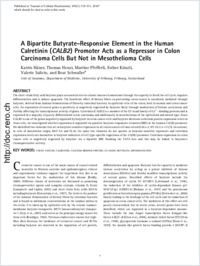A bipartite butyrate-responsive element in the human calretinin (CALB2) promoter acts as a repressor in colon carcinoma cells but not in mesothelioma cells
- Häner, Katrin Unit of Anatomy, Department of Medicine, University of Fribourg, Switzerland
- Henzi, Thomas Unit of Anatomy, Department of Medicine, University of Fribourg, Switzerland
- Pfefferli, Martine Unit of Anatomy, Department of Medicine, University of Fribourg, Switzerland
- Künzli, Esther Unit of Anatomy, Department of Medicine, University of Fribourg, Switzerland
- Salicio, Valerie Unit of Anatomy, Department of Medicine, University of Fribourg, Switzerland
- Schwaller, Beat Unit of Anatomy, Department of Medicine, University of Fribourg, Switzerland
-
08.12.2009
Published in:
- Journal of Cellular Biochemistry. - 2010, vol. 109, no. 3, p. 519-531
English
The short-chain fatty acid butyrate plays an essential role in colonic mucosa homeostasis through the capacity to block the cell cycle, regulate differentiation and to induce apoptosis. The beneficial effect of dietary fibers on preventing colon cancer is essentially mediated through butyrate, derived from luminal fermentation of fibers by intestinal bacteria. In epithelial cells of the colon, both in normal and colon cancer cells, the expression of several genes is positively or negatively regulated by butyrate likely through modulation of histone acetylation and thereby affecting the transcriptional activity of genes. Calretinin (CALB2) is a member of the EF-hand family of Ca²⁺-binding proteins and is expressed in a majority of poorly differentiated colon carcinoma and additionally in mesothelioma of the epithelioid and mixed type. Since CALB2 is one of the genes negatively regulated by butyrate in colon cancer cells and butyrate decreases calretinin protein expression levels in those cells, we investigated whether expression is regulated via putative butyrate-responsive elements (BRE) in the human CALB2 promoter. We identified two elements that act as butyrate-sensitive repressors in all colon cancer cell lines tested (CaCo-2, HT-29, Co-115/3). In contrast, in cells of mesothelial origin, MeT-5A and ZL34, the same two elements do not operate as butyrate-sensitive repressors and calretinin expression levels are insensitive to butyrate indicative of cell type-specific regulation of the CALB2 promoter. Calretinin expression in colon cancer cells is negatively regulated by butyrate via a bipartite BRE flanking the TATA box and this may be linked to butyrate's chemopreventive activity.
- Faculty
- Faculté des sciences et de médecine
- Department
- Département de Médecine
- Language
-
- English
- Classification
- Biological sciences
- License
-
License undefined
- Identifiers
-
- RERO DOC 17433
- DOI 10.1002/jcb.22429
- Persistent URL
- https://folia.unifr.ch/unifr/documents/301520
Statistics
Document views: 153
File downloads:
- pdf: 356
